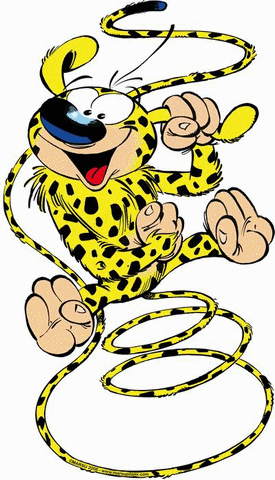This just out of curiosity and interest, could something like the marsupilami exist in our world? If you don't know, the marsupilami is pretty much a bipedal, arboreal monkey like monotreme (egg-laying mammal) native to the Palombian rainforests (which are ficitionalfictional) of South America. Its most noticeable feature is the absurdly elongated and slender tail, which can grow over six times its body length. More than just prehensile, the tail is extremely flexible, able to be bent and shaped into knots without sustaining damage; perhaps suggesting an internal structure rich in collagen, similar to that of the hagfish of deep oceans.
Both the male and female are able to use their tail as a weapon, by tightening the end into a fist which they can use to send jaguars flying or running home with a black eye and the remainder of the tail into a spring-like spiral for maximal force
The tail can be used for locomotion in a number of ways, including being used as a spring.
It is also mentioned to have gills for some odd reason which is probably inaccurate for a mammal.
Also renowned is the strength of the Marsupilami, far greater than what would be expected from an animal of its size. It is, however, a gentle and easy-going creature if not provoked. Its sharp intellect is betrayed by the use of tools, making it possibly the most sophisticated of all monotremes.
They are known for their distinct call: "Houba!" (by the males) or "Houbi!" (by the females); but are also able to mimic other sounds, including in some cases human speech.
The Marsupilami is omnivorous, its menu principally consisting of fruit, insects, and piranhas which it catches by using its tail like a fishing rod.
As a monotreme, it lay eggs while having mammalian features.
An astute creature, the Marsupilami lives in small family units and builds elaborate nests in the canopy; made out of sticks, vegetation, and ropes, and stuffed with bird feathers and decorated with flowers.
This nest is also built in such way that allows it to lock closed like an oyster in case of danger.
And plenty more info and details can be found at http://non-aliencreatures.wikia.com/wiki/Marsupilami, https://en.wikipedia.org/wiki/Marsupilami or http://marsupilami.wikia.com/wiki/Marsupilami_%28species%29.
Question- The question is really: could aan animal like this exist in our world? How could its ancestor gotget to South America in the first place?
(http://www.deviantart.com/art/Marsu-species-253660899, turns out there an African, Asian and aquatic species as well as according to the Marsupilami encyclopaediaencyclopedia). How could the long tail function and why so? How did it learnedlearn through generations to build such an odd nest? How many vertebrae would be in the tail? How can it lay eggs in this structure? And how did a cousin of the platypus and the echidna evolve a primate like-like structure in body shape and what did its ancestor lookedlook like when it coeco-xistedexisted with dinosaurs to before the Great American Interchange?
And there's plenty of more questions such can it use its tail to catch piranhas? Could there be an alternative to gills? Could it fend off jaguars? How would it move if it ended up on the ground? And could the tail have aan internal structure rich in collagen?

